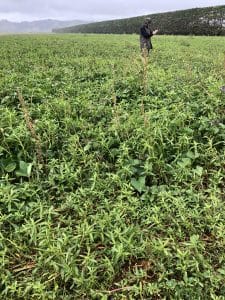Rural contractors and regional councils are among those supporting a new AgResearch programme on invasive alligator weed which has plagued northern farmers and growers for many years and is now spreading south.
Dr Trevor James, a senior AgResearch scientist leading the programme, says alligator weed has been found in Northland and Auckland for more than a century. Regarded as one of the world’s worst weeds, it’s now being found in Waikato and more recently in Taranaki and further south. Alligator weed is a perennial plant from South American that grows in both water and soil and can form a dense mat in either. Dr James says there are anecdotal stories about it causing Northland kumara growers to lose two crops out of five as they try to spray the weed one season, then spend another trying to clear it from the soil.
“One of the first aims of the programme is to confirm or otherwise some of the anecdotal evidence coming out.”
Any impacts on stock remain unclear but the weed can certainly take over pasture and is spread by tiny plant fragments which may survive for years.
Dr James says a beetle was introduced to control alligator weed in Northland & Auckland in the 1980s but this may be proving less effective as the weed spreads to regions with cooler temperatures.
“We can spray the top off – that’s the easy bit – but it its underground rhizomes (roots) can grow metres away. We are not going to find a silver bullet to control it. The key thing is to stop the spread.”
Alligator weed was discovered in 2020 in Manawatu and the Horizons and Taranaki regional councils are now among those attempting to control the weed. Greater Wellington’s council has it under watch for any spread into its region and Waikato Regional Council (WRC) already has an extensive effort to combat the spread of the weed.
Ben Elliot who works for WRC as a biosecurity contractor says alligator weed is particularly an issue in the delta area of the Waikato River and northern and warmer areas of the region.
He says many farmers and rural contractors are likely unaware of the weed and the risks it presents.
Rural Contractors NZ has joined with Waikato and other regional councils, Kiwifruit Vine Health and other organisations to support the AgResearch effort to understand and help control alligator weed.
RCNZ President Helen Slattery says rural contractors have a major role to play in helping curb the spread of all noxious weeds.
“Our members take machinery from farm to farm and we also often send baleage and hay to other regions. So, we want to do all we can to make our members aware of the risks of spreading anything that can cause harm to our nation’s biosecurity.”
She says that includes rural contractors observing machinery hygiene practices especially in areas where there any alerts about the presence of biosecurity risks such as alligator weed or any other noxious weed.
Dr James says one of the first pieces of research is to test whether alligator weed can survive in baleage which is often exported by rural contractors and farmers to other regions.
“Human-aided dispersal is still our biggest issue with noxious weeds.”
The AgResearch programme is being funded by MPI and the Sustainable Food and Fibres Fund, with $270,000 over three years.
Regional councils had their own methods of curbing its spread and so far south of Auckland it was so far mostly confined to pockets.
“But the thing is on the move.”



